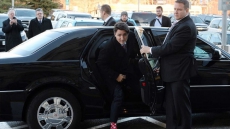OTTAWA — The country's annual inflation rate picked up the pace last month to 1.4 per cent as the influence of last year's oil-price plunge faded in the economic data.
Statistics Canada's November inflation reading, released Friday, accelerated from just one per cent in October.
But economists noted the inflationary increase had more to do with the waning impact of the late-2014 slide in energy prices than any surge in underlying inflationary pressure.
As evidence, Leslie Preston of TD Economics pointed to the energy category for November, which found prices had fallen 6.4 per cent compared to year-over-year drops of 13 per cent earlier in 2015.
"That's kind of a weight that's been weighing on headline inflation — and that weight is getting lighter," Preston said Friday in an interview.
Meanwhile, the annual core inflation rate, which excludes some volatile items such as gasoline, slowed in last month when it rose by just two per cent. That's compared to an October increase of 2.1 per cent in the underlying core rate, which is closely followed by the Bank of Canada.
Still, headline inflation's 1.4-per-cent gain moved it a little closer to the central bank's ideal target of two per cent.
The federal statistical agency's latest consumer price index said higher prices for food and shelter were among the biggest contributors to the increase. Prices climbed in seven of the survey's eight major categories.
The index found that food prices were up 3.4 per cent compared to a year earlier, thanks in large part to the higher costs of meat and fresh vegetables. The category of fresh or frozen meat, excluding poultry, was up six per cent, while beef alone climbed 8.1 per cent.
The report says the cost of fresh vegetables rose by 10.9 per cent following big, year-over-year increases in the prices of tomatoes and lettuce

Since the country is a big goods importer, many of the price increases were largely due to the effects of the slumping Canadian dollar, Preston said.
This week, the loonie ducked below 72 cents US for the first time since May 2004.
Preston expects the Bank of Canada to stand pat on its benchmark interest rate at its next policy meeting in January. TD doesn't predict governor Stephen Poloz to move the rate for close to two years as the country's modest growth heads in the right direction, she added.
Poloz cut the rate twice in 2015 to ease some of the negative economic impact of the oil-price shock.
On the flip side, lower prices in the overall transportation category, which fell 1.1 per cent, put downward pressure on inflation. A closer look at the data shows that gasoline prices fell last month by 10.6 per cent compared to a year earlier.
World energy prices have dipped in recent weeks, which could continue to push down on inflation. But experts predict the upward price momentum of the loonie's slump to help offset that pressure.
"The sagging loonie will simply add to the upswing, countering any dampening impact from the latest slide in energy prices," BMO chief economist Doug Porter wrote in a note to clients Friday. "The days of ultra-low headline inflation readings are now in the past, and we will see it grind back toward two per cent in the next few months."
Statistics Canada said consumer prices rose in every province last month compared to the year before.
On a seasonally adjusted month-over-month basis, the consumer price index crept up 0.2 per cent in November, which matched October's increase.
The agency also released October data for wholesale trade, which fell 0.6 per cent to $54.7 billion — its fourth-straight monthly drop.

It said lower trade figures were recorded in four areas that, when combined, represent 64 per cent of all sales.
Sales fell by three per cent to $10.5 billion in the food, beverage and tobacco category — its third decrease in four months. The category of motor vehicle and parts registered a 2.1 per cent drop to $9.5 billion, its fourth-straight tumble.

